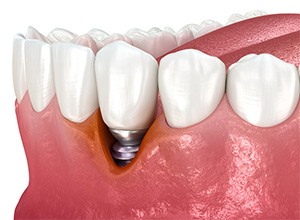
Dental implants are successful in the vast majority of cases, so there is no need to be overly concerned that something will go wrong with your restored smile. However, it still must be acknowledged that, in rare cases, dental implant failure can occur. If you ever experience concerning symptoms around your new teeth, contact our Meriden team right away. We may be able to get things back on track via our dental implant salvage services.
Why Do Dental Implants Fail?

Dental implants are successful in the vast majority of cases, so there is no need to be overly concerned that something will go wrong with your restored smile. However, it still must be acknowledged that, in rare cases, dental implant failure can occur. If you ever experience concerning symptoms around your new teeth, contact our Meriden team right away. We may be able to get things back on track via our dental implant salvage services.
When dental implants fail, it is most commonly due to an infection known as peri-implantitis. It occurs when harmful bacteria are allowed to accumulate in the mouth. They can invade the tissue around an implant and start to attack it. Eventually, the infection can cause so much damage that the implant loses its base of support. Often, poor oral hygiene is a major contributor to dental implant failure.
Other factors that might lead to dental implant failure include:
- Teeth grinding and clenching
- Facial injuries
- Underlying medical conditions, such as certain types of cancer and bone diseases
Symptoms of a Failed Dental Implant

Dental implant failure can occur at any time, whether it is weeks, months, years, or even decades after the initial placement surgery. Therefore, it is important that you monitor your oral health and seek professional care if you notice anything is amiss.
Here are some indications that you should see our team for treatment:
- After you heal from your surgery, your implants should feel comfortable in your mouth. Severe or unusual pain should be evaluated by a qualified dentist.
- An implant feels loose. This may be a problem with the implant itself or the restoration that is attached to it.
- Signs of infection. Redness, swelling, gum recession, and pus could all point to peri-implantitis.
- Difficulty eating. Once you adapt to using your implants, you should find it easy to eat almost any food. Difficulties in this area are a big red flag.
How Dental Implant Salvage Works

Schedule an appointment with us as soon as you suspect something is wrong with your implants. The earlier you receive care, the more likely it is we can address the issue via conservative means.
When you arrive in our office, we will examine your mouth, ask about your symptoms, and use advanced imaging equipment to understand what is happening beneath your gumline. Then, we will be able to recommend your next steps.
In some cases, relatively simple treatment is required. You might just need a new restoration or a course of antibiotics. However, if the situation is severe enough, we might need to completely remove the failing implant. Later, after a healing period and any necessary restorative care, you may become eligible for a new implant.
